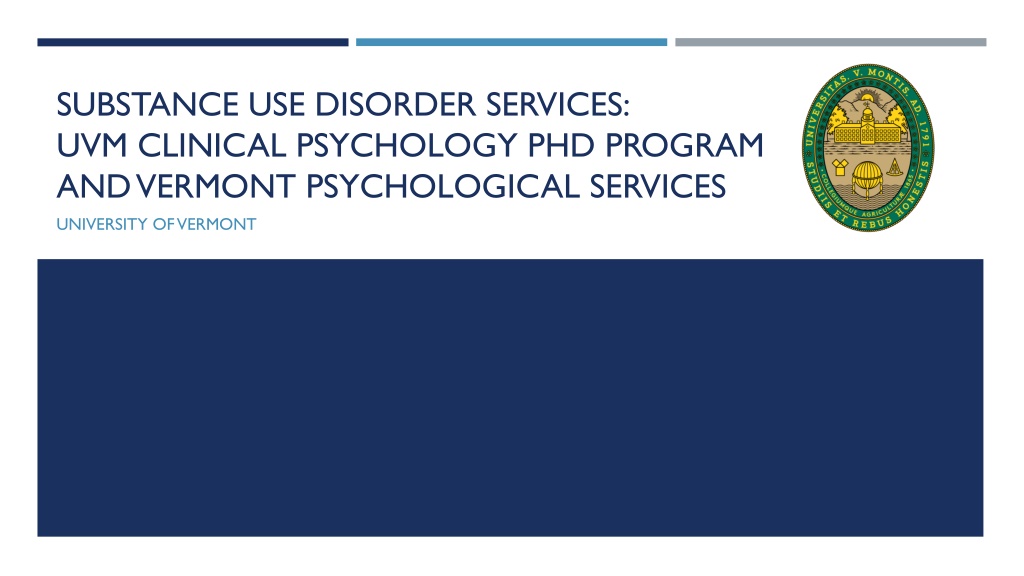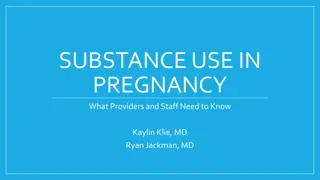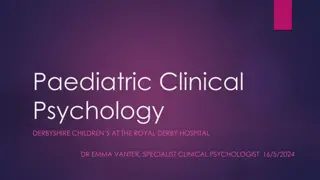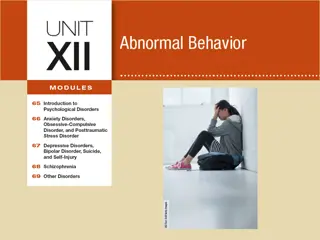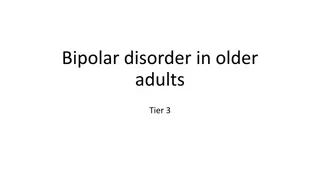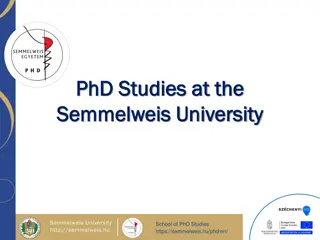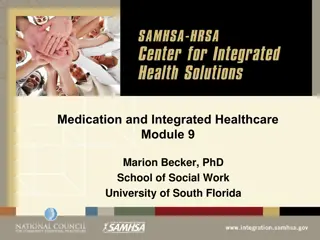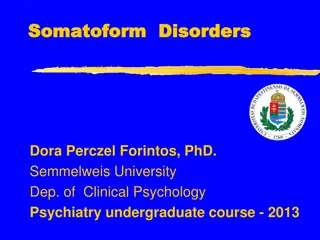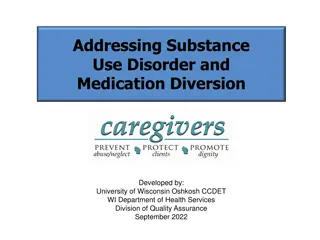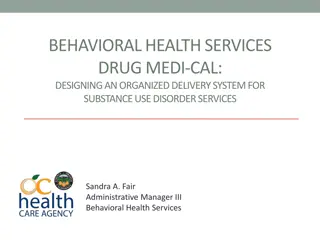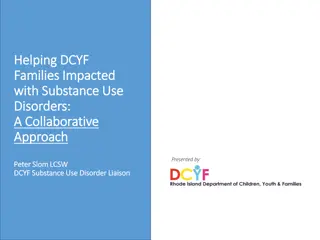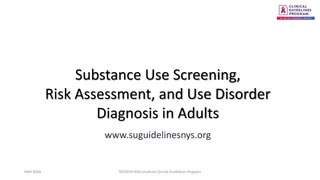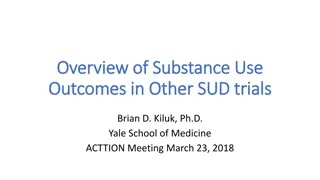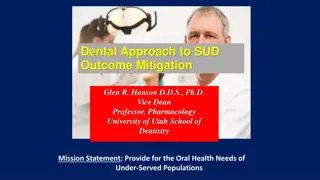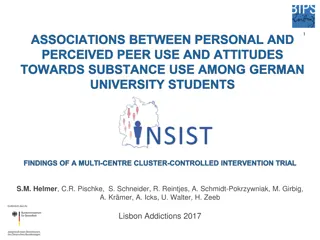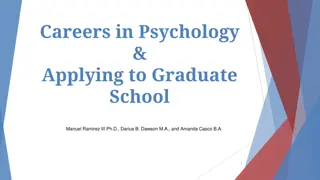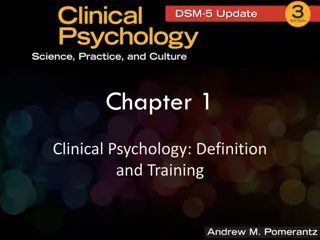Substance Use Disorder Services at UVM Clinical Psychology PhD Program
Providing substance use disorder services, the UVM Clinical Psychology PhD program and Vermont Psychological Services at the University of Vermont offer comprehensive support for individuals struggling with addiction.
Download Presentation

Please find below an Image/Link to download the presentation.
The content on the website is provided AS IS for your information and personal use only. It may not be sold, licensed, or shared on other websites without obtaining consent from the author. Download presentation by click this link. If you encounter any issues during the download, it is possible that the publisher has removed the file from their server.
E N D
Presentation Transcript
SUBSTANCE USE DISORDER SERVICES: UVM CLINICAL PSYCHOLOGY PHD PROGRAM AND VERMONT PSYCHOLOGICAL SERVICES UNIVERSITY OF VERMONT
SUBSTANCE USE AND THE JUSTICE SYSTEM Estimated that 13% of incarcerated people used heroin regularly upon arrest People incarcerated suffer from SUDs at 2x-3x the rates of the general population Similar numbers for those on parole or probation The majority of people with OUD have a co-occurring mental illness (27% with severe mental illness) U.S. DEPARTMENT OF JUSTICE, 2017; FEUCHT & GFROERER, 2011; FAZEL ET AL., 2017; JONES & MCCANCE-KATZ, 2019
SUBSTANCE USE AND THE JUSTICE SYSTEM Only about 11% of incarcerated people receive treatment for a substance use disorder Only around 5% of treatment referrals made by parole or probation agencies for opioid use disorder result in MOUD 35-75% of individuals who begin MOUD discontinue their treatment in just the first year of treatment Chances of overdose skyrocket post- release Estimates as high as 129x hazard ratio THE NATIONAL CENTER ON ADDICTION AND SUBSTANCE ABUSE, 2010; KRAWCZYK ET AL., 2017; BINSWANGER ET A. 2007; SUBSTANCE ABUSE AND MENTAL HEALTH SERVICES ADMINISTRATION, 2019
THE VERMONT CORRECTIONAL ADDICTION TREATMENT PROGRAM (V.C.A.P.) Established in 2016 Our Current Team: Rachel Gehman, MA Thomas Geist, MS MA Tim Stickle, PhD Nathan Moxley-Kelly, MS
V.C.A.P. PATIENTS Historically, primarily pre-trial federal detainees A time of transition and uncertainty Recently including state and federal cases Variety of charges, violations Highly diverse, motivated, and engaged SUD and co-occurring mental health disorders
V.C.A.P. SERVICES Assessment Full understanding of presenting problem & comorbidities Context of history, goals, and strengths Evidence-Based Treatment Individual and Group CBT; ACT; MI Advocacy Coordinate with Marshalls and Probation
The SUDSS Team! Nathan Moxley-Kelly, MSc Rachel Gehman, MA Jill Giannini, BA Rhiannon Wiley, MA Tim Stickle, PhD
Substance Use Disorders Specialty Service (SUDSS) Designed to facilitate student s interest and motivation to help! Student s passion Clinical supervisors and researchers with expertise Material resources (E.g., office space, assessment tools, etc.) How do we figure out how to help? Reached out to providers and program directors 1. Expressed our desire to help 2. Described our resources 3. Asked what was needed Providers discussed issues related to: Waitlists for treatment Siloing Insufficient time A lack of screening and assessment Then began developing a service to address the identified needs!
How does SUDSS work? Treatment Approach the work with a non-judgmental, harm- reduction mindset Clinicians will help clients accomplish their goals Abstinence, improved functioning, reduced suffering, etc. Clinicians use evidence-based interventions Motivational interviewing (MI) Cognitive-behavioral therapy (CBT)
- - - Recurrence of use Hospitalization Incarceration MOUD Housing Stability Social Support Employment Depression Anxiety PTSD ADHD Early Peer Parental Substance Use Improved Mental Health and Coping Skills Adverse Childhood Experience Trauma Genetic Risk Recovery!
How does SUDSS work? Evaluation and Referral Structured and semi-structured interviews Diagnosing DSM-5 disorders Differential diagnosis Functioning (e.g., cognitive) Treatment targets Treatment plans Assessment is collaborative! Reports Access special services (e.g., services for persons with disability) Guide intervention Referral to an appropriate care provider Including providers of MOUD
STEPDOWN SERVICE - GOALS VCAP 2016- 1. Increase post-release treatment retention for MOUD Some evidence suggests psychosocial adjuncts increase MOUD retention a. 2. Treat co-occurring mental health disorders across a continuum of care SUDSS 2022- Associated with non-compliance, drop out, overdose, etc. a. 3. Prioritize Harm reduction 4. Build trust and break down barriers in the mental health system 5. Provide Training for future clinicians Stepdown Service 2023- A future workforce in Vermont a)
STEPDOWN SERVICE RESOURCES SUDSS service resources: Telehealth prescribing of MOUD by Tildabeth Doscher MD, MPH Network of community providers (e.g., UVM s Addiction Treatment Program) Fentanyl Testing Strips Narcan Clinical supervisors and researchers with expertise Material resources (e.g., office space, assessment tools, etc.) Trained clinicians
OPIOID SETTLEMENT ADVISORY MANDATE 18 V.S.A. 4774 18 V.S.A. 4774 (6) treating incarcerated populations, specifically: (b) Expenditures from the Opioid Abatement Special Fund shall be used for the following opioid prevention, intervention, treatment, recovery, harm reduction, and evaluation activities: (A) providing evidence-based or evidence-informed treatment and recovery support, including medication- assisted treatment for individuals with opioid use disorder or co-occurring substance use or mental health disorders while transitioning out of the criminal justice system; and (5) addressing the needs of criminal justice-involved persons (B) increasing funding for correctional facilities to provide treatment and recovery support to inmates with opioid use disorder;
OPIOID SETTLEMENT ADVISORY MANDATE 18 V.S.A. 4774 18 V.S.A. 4774 (10) supporting efforts to provide leadership, planning, coordination, facilitation, training, and technical assistance (5) expanding the availability of warm handoff programs and recovery services, specifically: (12) implementing other evidence-based or evidence-informed programs or strategies that support prevention, harm reduction, treatment, or recovery of opioid use disorder and any co- occurring substance use or mental health disorder; and to abate the opioid epidemic; (C) broadening the scope of recovery services to include co-occurring substance use disorder or mental health conditions;
FUNDING VCAP and SUDSS meet specific needs related to the Opioid Settlement Committee s recommendations In line with statewide initiatives to provide efficacious intervention for OUD To continue to provide care and to expand its services additional funding is needed Administrative costs Graduate Student stipend Supplies Travel Vouchers for Clients Training Materials Therapy Materials (e.g., client workbooks)
QUESTIONS? Contact: Thomas.Geist@uvm.edu
